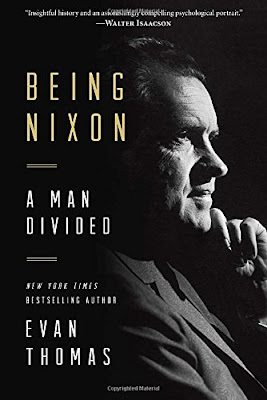Book in Review: Being Nixon
 I am new to the world of Nixon, but have always been interested in the mystery of the man. A figure so maligned by critics and history alike draws not only my sympathy but a desire to understand him. What led him to heights so great and a decline so tragic? What motivated him to allow the White House secret arm of dirty tricks? And why did he cover up Watergate, paying off those involved not to talk?
I am new to the world of Nixon, but have always been interested in the mystery of the man. A figure so maligned by critics and history alike draws not only my sympathy but a desire to understand him. What led him to heights so great and a decline so tragic? What motivated him to allow the White House secret arm of dirty tricks? And why did he cover up Watergate, paying off those involved not to talk?I found Being Nixon ambitious. How do you try to understand a man who does not understand himself? Evan Thomas attempts to do this very thing as he walks through the childhood, adult, and political life of Nixon. I found his work excellent. He is objective in his writing, maybe a hint sympathetic. As I read, I found myself rooting for RN, grimacing as I saw the road signs warning of the collapse to come.
The truth about Nixon is that he was terribly convoluted. He was a mystery and Thomas captures this beautifully. Nixon was a shy introvert who was observably relaxed next to dictators. He welcomed mudslinging campaigns against his opponents, yet could not confront those closest to him. He found “weakness intolerable” but he could never let old wounds heal.
Henry Kissinger supposed that Nixon was unloved as a child and fought to compensate by greatness. Thomas’ early life history agrees with Kissinger’s analysis, as he portrays a motivated child who would never give up. He wanted to “do some good for some people.” This drive for significance and power ruled Nixon throughout his life. When pondering giving up the political life in the 1960s it is his daughter Tricia who tellingly told him, “If you do not run daddy, you will have nothing to live for.” Could it be that his incredible drive brought both his success and his ruin?
In the end, “Being Nixon” is a sad story about an ambitious man. Much like a slippery slope, Nixon created habits in his life (out of a desire for power and self-protection) that predicated his demise. Nixon had no self awareness. He held too many grudges. He could not forgive the past. He could not confront people. And once he was caught, he did whatever he could to cover up—“favoring hush money over full disclosure.” The result was drastic.
I think there is a little Richard Nixon in all of us. We are all creatures of conflict who war against our inner natures. We are all bent on preserving ourselves whatever the cost; and the things we want most often consume us.
I found that Nixon himself is a jumbled mess, much like most of us. Richard Nixon is all too human.
Find my review helpful? Let me know at Amazon.



Comments
Post a Comment